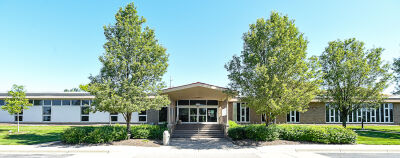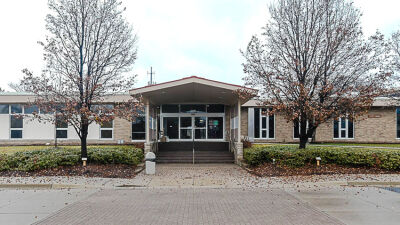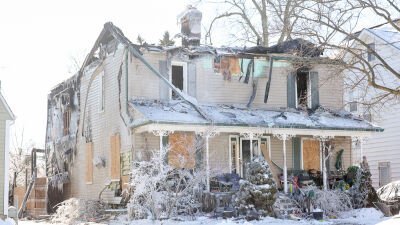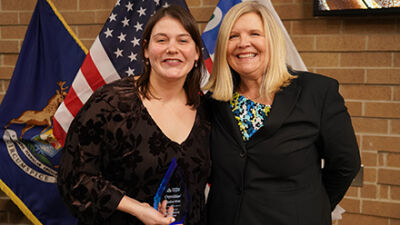MADISON HEIGHTS — Members of the Madison Heights City Council have been reviewing a working draft of the budget for fiscal year 2025-26, one that maintains the current millage rate and avoids tax increases for the time being.
“This is a very difficult time for us,” said Mark Bliss, the mayor pro tem. “It’s difficult not only for residents but also the city, as costs continue to rise. We’re dealing with hyper-inflation and incredible market uncertainty right now, and all of the tariffs are changing how city contractors are buying and storing their materials, which has led to cost increases. So we’re trying to balance all of those things. Raising taxes significantly deters new homebuyers, so it’s important we try to keep our taxes low.”
Melissa Marsh, the city manager, presented the proposal to council April 15. She was joined at the public meeting by Linda Kunath, the finance director.
In its current form, the new budget would not increase taxes, keeping the millage rate locked in at 25.4572 mills — the same as the current fiscal year. The city collects $1 for every $1,000 of a property’s taxable value, multiplied by the millage rate.
The proposed budget includes a 6.33% increase in water and sewer rates to absorb rising commodity costs. Officials note that even with this increase, Madison Heights will still boast one of the lowest water and sewer rates in the tri-county area.
The budget under consideration weighs in at $66.1 million, of which $42.3 million is allocated for the general fund — a decrease of 9.2% from the current fiscal year’s amended budget. This drop is the result of reduced capital spending, as well as the elimination of four vacant full-time positions.
Meanwhile, $8.8 million is being allocated to the capital improvement fund, which pays for a variety of road work, park improvements and water/sewer line replacements.
On the note of water and sewer, $14.2 million is being proposed for the water and sewer fund, which takes into account rising costs for water and sewage treatment and other infrastructure needs.
The proposed budget is balanced by using more than $436,500 in general fund reserves. Available reserves are expected to total $11.4 million by the end of the current fiscal year.
The proposed budget also sets aside $1.8 million for a new trash hauler contract, which is expected to remain Priority Waste.
In addition, funding is available for an additional school resource officer, which would be jointly funded with the Lamphere Schools. Funds are also available for IT infrastructure upgrades at the city’s administrative offices, including a firewall update and improvements to telecommunications.
In terms of projects, nearly $2 million is planned for major and local street repairs, including along John R Road, and $2.5 million is earmarked for water and sewer work.
The city is also investing in parks and recreation, with improvements planned at Rosie’s Park. The proposal calls for $15,000 to expand community programming, as well as $3,000 to continue the city’s food composting drop-off program. Another $15,000 is earmarked for the makerspace and other programs at the Madison Heights Public Library.
The proposed budget also trims back the length of the annual recreation brochure, and puts the savings towards a new quarterly citywide newsletter that will be included as a newspaper insert with the Madison-Park News.
As for ongoing costs, the police and fire pension fund continues to be a significant expense for the city. The proposed budget allocates $7.7 million for the pension fund, including $4 million in contributions beyond the required annual minimum. The goal is to raise the pension funding level above 60% by June 2026.
Marsh also noted that the city has seen reduced revenues due to the decline of cable franchise fees from $500,000 to $350,000. Court revenues have been declining, as well.
Madison Heights, like all Michigan municipalities, continues to wrestle with the long-term effects of Proposal A and the Headlee Amendment, two state policies that together limit what a city can collect from its tax base to 5% or the rate of inflation, whichever is less.
Officials describe the system as an unfair tax structure for those purchasing a new home. Barring legislative changes at the state, future budgets may have to adjust service levels or incorporate targeted millage proposals to maintain current levels.
“Declining federal and state funding, combined with rising costs across the board, means we are facing tighter financial constraints than in previous years,” said Mayor Roslyn Grafstein via email. “Property taxes remain our largest source of revenue, but they are not increasing at the same rate as our expenses.
“Despite these challenges, my top priority remains unchanged: public safety. It doesn’t matter how many programs or services we offer if our residents do not feel safe,” Grafstein said. “That’s why, even in a constrained budget, we have included funding for a second requested school resource officer at Lamphere Schools, with the city covering 30% of the cost.”
She added that while the Madison District Public Schools have not yet opted into the program, the city is eager to partner with them in the future.
The mayor noted that the city has taken a long-term strategic planning approach to budgeting the last six years.
“For this year’s proposed budget, we have worked hard to preserve core services,” she said. “We were able to eliminate four full-time positions without layoffs, and deferred $1 million in capital projects, many of which we hope to support later through grant funding. Along with public safety, we are maintaining funding for infrastructure, sustainability and quality-of-life initiatives.”
While the millage rate will remain the same for now, she cautioned that “we need to be cognizant of rising expenses, and as grants and other outside funding dries up, we may need to consider new millages or revenue streams, if costs continue to rise faster than revenues.”
Madison Heights City Councilmember Quinn Wright said the budget proposal reflects the city’s priorities to balance public safety, city services and quality of life.
“That includes clean parks and effective trash services that fit the residents’ needs,” he said. “We’re also trying to find cost-efficient ways to approach capital improvements that need to happen, like roads and infrastructure, while also investing in the future with programs like our mental health co-responder program and our school resource officers, who build relations with the kids so that they can have that trust. I’d like to see us continue to expand on both of these programs, if possible.”
Madison Heights City Councilmember David Soltis said the council has been approaching the new budget very conservatively.
“We know money is very tight for a lot of citizens right now,” Soltis said. “We’re trying to be good stewards of the taxpayers’ dollar.”
 Publication select ▼
Publication select ▼


























